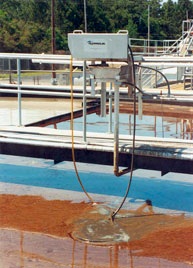 Packaged-food producers frequently use and then must discard large batches of cooking oil used in their process. Usually they drain most of the oil directly from equipment, but they must remove residual oil by regularly washing fryers, ovens, conveyors, and other machinery.
Packaged-food producers frequently use and then must discard large batches of cooking oil used in their process. Usually they drain most of the oil directly from equipment, but they must remove residual oil by regularly washing fryers, ovens, conveyors, and other machinery.
The oil mixes with the wash water and becomes part of the plants wastewater stream. Having oil in wastewater complicates the wastewater-treatment process by making it more expensive, more time-consuming, and less effective. Additionally, as with other manufacturers, packaged-food producers want to reduce waste and decrease the environmental impact of operations. That is why removing used oil and solids from wastewater before it is discharged is a priority.
One such food producer is Brakebush Brothers, a family owned manufacturer of frozen, cooked chicken products that has been operating in Westfield, WI, since 1925. Recently, Brakebush Brothers upgraded parts of its wastewater treatment system to accommodate increased production, and, in the process, discovered an immediate-impact, low-cost way to recover used cooking oil from wastewater.
Brakebush Brothers’ plant runs 24 hours a day on three shifts — two for production and one for cleaning. The company uses cooking oil during processing. After processing and cleaning, an oil/wastewater mix collects at two lift stations, and then is piped to an on-site wastewater treatment facility. The wastewater passes through a dissolved air filtration (DAF) system. Sludge removed during filtration is sent through a belt press to remove even more water, and the resulting solid waste is hauled away.
PROBLEM: Large slugs of oil were “causing chaos” in Brakebush Brothers’ wastewater treatment system.
Wastewater treatment plant operators would add additional alum to treat the oil slugs, but adding more alum caused more sludge. Also, the oil would clog up the system, especially the porous belt-press material, reducing efficiency and requiring additional maintenance. The operators tried to combat this by adding lime to the belt-press process increasing cost to the wastewater treatment plant.
When the increased production compounded the oil-induced complications, Charlie Parrish from Water Tech (chemical supplier) advised Brakebush to remove the oil from the wastewater before it entered the lift stations, thus eliminating the need for additional chemicals and maintenance. He suggested using an oil skimmer, a solution he has been recommending to clients for 30 years because “they are almost ridiculously simple, and ridiculously cost effective.”
SOLUTION: Brakebush Brothers turned to Cleveland-based Oil Skimmers Inc. and their Wisconsin representative, Recovery Equipment Corporation, resulting in the initial purchase of two Model 6V Brill™ oil-recovery systems to remove oil from water before entering each lift station. Today, each skimmer removes 1,392 lbs of oil daily from the wastewater stream. The solution has worked so well that the company is adding additional skimmers, said Bucky Walters, wastewater operator.
BENEFITS: The Model 6Vs have enabled Brakebush Brothers to:
Oil Skimmers’ Model 6V utilizes a unique floating-tube system. The closed-loop tube — made of flexible, specially formulated plastic — attracts oil but not water. The unit continuously draws the oil-covered tube through scrapers (which remove the oil) and returns the clean tube to the water surface to gather more oil.
At Brakebush Brothers, the recovered oil is pumped into a 5,000-gallon tanker and is sold to Sanimax, an international company that manufacturers biodiesel from used cooking oil. The solid waste is sent to United Grease Inc., where it feeds an anaerobic digester that generates electricity for sale to other consumers.